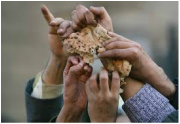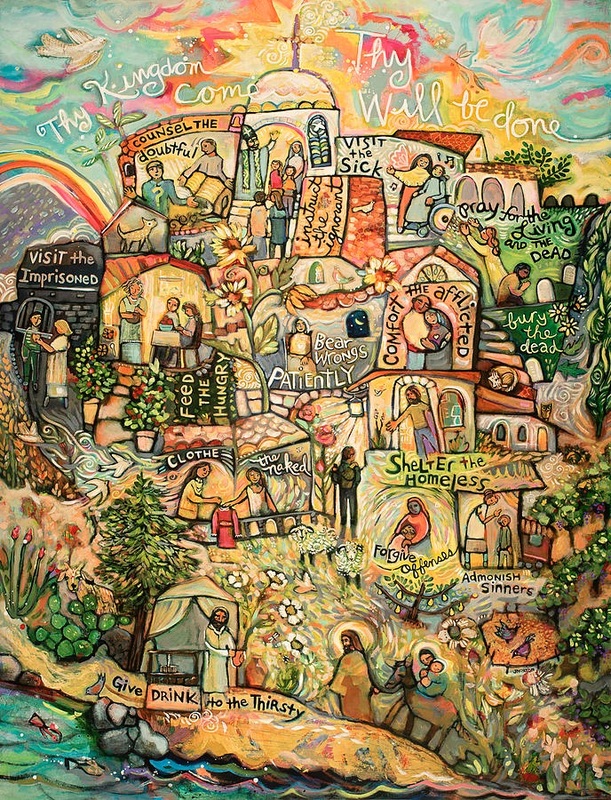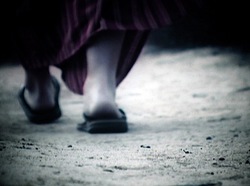
- Mahatma Gandhi
It is our bread we eat, not my own… Now none dares go hungry as long as another has bread.
- Dietrich Bonhoeffer
READINGS:
Acts 2.41-47 (The Message)
That day about three thousand took him at his word, were baptized and were signed up. They committed themselves to the teaching of the apostles, the life together, the common meal, and the prayers. Everyone around was in awe—all those wonders and signs done through the apostles! And all the believers lived in a wonderful harmony, holding everything in common. They sold whatever they owned and pooled their resources so that each person’s need was met. They followed a daily discipline of worship in the Temple followed by meals at home, every meal a celebration, exuberant and joyful, as they praised God. People in general liked what they saw. Every day their number grew as God added those who were saved.
Exodus 16.1-3, 11-18, 31 (The Message)
On the fifteenth day of the second month after they had left Egypt, the whole company of Israel moved on from Elim to the Wilderness of Sin which is between Elim and Sinai. The whole company of Israel complained against Moses and Aaron there in the wilderness. The Israelites said, “Why didn’t God let us die in comfort in Egypt where we had lamb stew and all the bread we could eat? You’ve brought us out into this wilderness to starve us to death, the whole company of Israel!” God spoke to Moses, “I’ve listened to the complaints of the Israelites. Now tell them: ‘At dusk you will eat meat and at dawn you’ll eat your fill of bread; and you’ll realize that I am God, your God.’” That evening quail flew in and covered the camp and in the morning there was a layer of dew all over the camp. When the layer of dew had lifted, there on the wilderness ground was a fine flaky something, fine as frost on the ground. The Israelites took one look and said to one another, man-hu (What is it?). They had no idea what it was. So Moses told them, “It’s the bread God has given you to eat. And these are God’s instructions: ‘Gather enough for each person, about two quarts per person; gather enough for everyone in your tent.’” The People of Israel went to work and started gathering, some more, some less, but when they measured out what they had gathered, those who gathered more had no extra and those who gathered less weren’t short—each person had gathered as much as was needed. The Israelites named it manna (What is it?). It looked like coriander seed, whitish. And it tasted like a cracker with honey.
REFLECTION:
As we continue our study of The Lord’s Prayer on Sunday, we will finally switch gears and talk about something practical, something close to home, something that touches our lives day by day by day, something oh-so-important for our lives: sustenance, food and drink, i.e. our daily bread, as in “Give us this day our daily bread.”
It’s fine to talk about all that high falutin’ theology at the beginning of the prayer; theology whose meaning passes us by. God in the highest heavens, above, beyond, and before the reach of our vision and understanding; something we can’t control, possess, or hold on to. Say what? Then there’s the matter of that mysterious kingdom of God. What is it? When is it? For that matter, where is it? Come on now! Surely we can find something more accessible to talk about.
Even if we don’t understand God’s kingdom; this much we know… we must wait patiently for it. We must wait and wait and wait on God’s good pleasure. The timing of God’s kingdom arriving on earth is kind of like that old farming expression; we must wait “till the cows come home!”
If that’s the case, it’s a good thing we switch gears and talk about daily bread. We will certainly need a whole bunch of it as we wait on God’s kingdom. The prayer might as well read, “God, while we wait on you, give us bread every day so we can keep up our strength.”
But what if that’s not the case? What if the request for daily bread doesn’t represent a switch from the abstract to the practical? What if the bread we seek doesn’t describe what we need while we wait for God’s kingdom? What if bread, daily bread, describes the nature of God’s kingdom present now, bread we receive as we depend on God who is not only in the highest heavens, but in our midst? And what if the bread we receive is meant to be shared with others? In this instance, bread becomes a powerful symbol of life in the kingdom.
Luke knows that the kingdom is present now. “Once Jesus was asked by the Pharisees when the kingdom of God was coming, and he answered, “The kingdom of God is not coming with things that can be observed; nor will they say, ‘Look, here it is!’ or ‘There it is!’ For, in fact, the kingdom of God is among you” (Luke 17.20-21).
John knows that the kingdom is present now. “Very truly, I tell you, anyone who hears my word and believes him who sent me has eternal life, and does not come under judgment, but has passed from death to life” (John 5.24).
The writer of 1 John knows that the kingdom is present now. “We know that we have passed from death to life because we love one another” (1 John 3.14).
They all know that the bread we receive and share with others describes life in the kingdom, and symbolizes life in wonderful harmony where all receive what they need, where all live in pursuit of justice and fairness. They know that such life is possible only in God’s kingdom.
The question for us is this, “Do we know this and live the life of God’s kingdom?” Let’s examine that question on Sunday morning, when I hope we will worship together at 8:30 or 10:30.
Bo




 RSS Feed
RSS Feed



